Living in Puerto Rico: Pros and Cons in 2024 (By a Local!)
Life in Puerto Rico as an expat in 2024 can be a wonderful experience. There is so much to explore and discover in this Caribbean island and unincorporated U.S. territory – from diverse cultures and good food to stupendous natural beauty and a low cost of living, there’s something for everyone.
Continue reading to find out if this tropical island paradise is a great option for you by weighing up these important pros and cons of living in Puerto Rico.
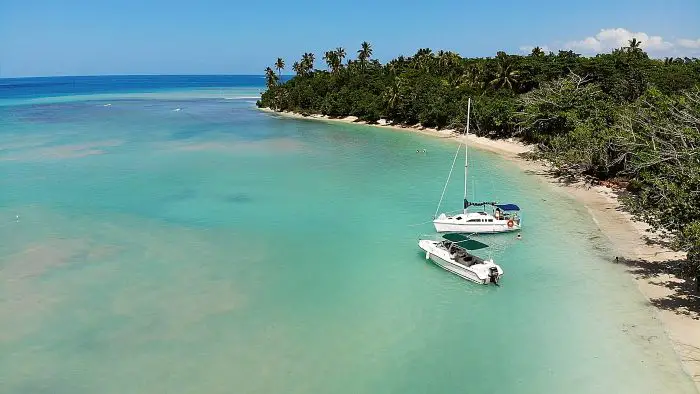
As a local, I have my views of living in Puerto Rico.
Lately, Puerto Rico has become a popular destination for ex-pats and people who are deciding to move and invest. If you are one of those who are considering the same, this Puerto Rico living guide should help you to make your decision.
Moving to Puerto Rico as an expat brings with it a range of considerations that are crucial to ensuring a smooth transition. There are some important aspects to keep in mind though.
Should you move to Puerto Rico?
Continue reading to discover what life in Puerto Rico is like as well as the most important things to know before moving to Puerto Rico as an expat. You will also find a list of pros and cons of living in Puerto Rico 2024.
Daily Life in Puerto Rico
Fast facts about life in Puerto Rico:
- Country name: Commonwealth of Puerto Rico
- Capital: San Juan
- Size: 9,104 km² (3,508 mi²)
- Official language: Spanish, English
- Government: Republican form of government
- Currency: U.S. dollar (USD)
- Religion: Roman Catholic
- Time Zone: Atlantic Standard Time (AST) GMT-4
- Calling code: +1
- Voltage: 120V supply voltage and 60Hz
>> Read next:
- Your guide to the cheapest islands in the Caribbean
- Considering Central America? Here are the pros and cons of living in Costa Rica
- 10 best tropical family islands in the world
- Your essential moving abroad checklist
- Test your knowledge with this quiz about USA
- The 100 absolute best places to visit in USA
- 12 cheapest places in the USA right now
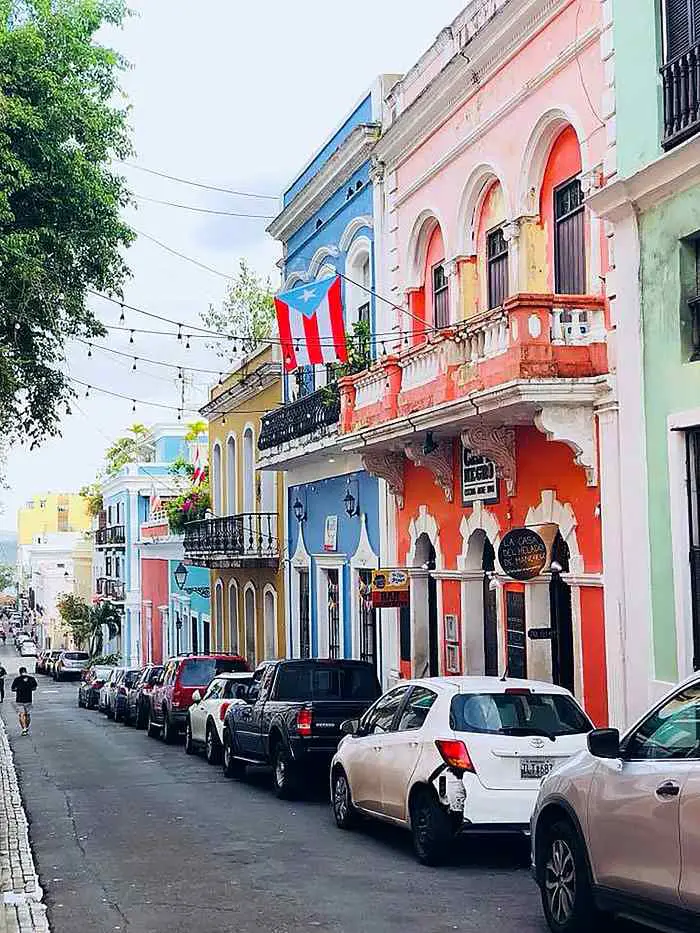
Continue reading to discover some important things
you’d want and need to know as an expat moving to Puerto Rico.
Is Puerto Rico a Good Place to Live?
What is daily life like in Puerto Rico?
This captivating island territory, with a rich cultural heritage and breathtaking natural beauty, boasts a diverse heritage that permeates every aspect of daily life. Life in Puerto Rico is serene, informal, carefree, and relaxed. Its warm tropical climate matched with warm and friendly people that are known for their hospitality and strong sense of community.
From its vibrant cities to its pristine beaches and lush rainforests, life in Puerto Rico offers a great experience.
Is Puerto Rico a good place to live in?
When considering a move to a new location, it’s natural to wonder if the chosen destination is a good place to live. In the case of Puerto Rico, the answer is a resounding yes.
This beautiful Caribbean island offers a myriad of opportunities and advantages that make it an enticing choice for individuals seeking a vibrant and fulfilling lifestyle.
Although, if you are considering moving to Puerto Rico, keep in mind to make it in the most sustainable way, respecting the locals, their culture, beliefs, and their way of life.
Why would people move to Puerto Rico?
Puerto Rico’s unique blend of natural beauty, cultural richness, affordability, and favorable living conditions make it a desirable place to call home.
The island’s tropical climate, pristine beaches, lush rainforests, and breathtaking landscapes create a serene and picturesque environment that residents can enjoy all year round.
Whether it’s exploring the El Yunque National Forest, diving into crystal-clear waters, or simply lounging on the sandy shores, Puerto Rico offers an abundance of natural wonders to discover and appreciate.
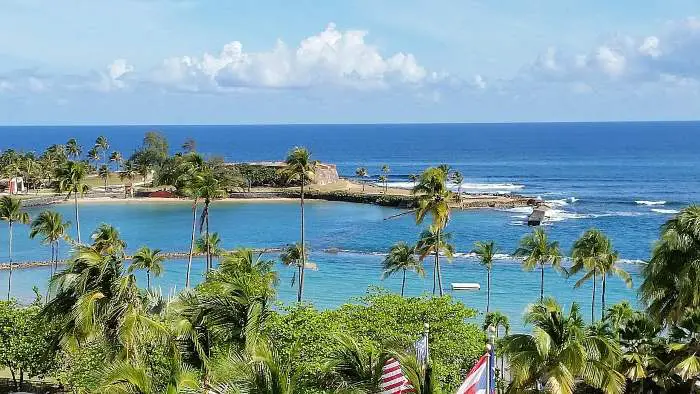
Languages Spoken in Puerto Rico
One of the aspects that make Puerto Rico an attractive place to live is its linguistic diversity. While the official language is Spanish, English is widely spoken, particularly in urban areas and tourist hotspots.
This linguistic blend creates a welcoming environment for ex-pats and ensures effective communication and integration into the local community. Embracing the opportunity to learn and engage in both languages can greatly enrich one’s experience in Puerto Rico.
As it was mentioned, the main language is Spanish. We encourage you to learn the language if you are planning to move to Puerto Rico and make a good effort to immerse yourself in the local culture of the island.
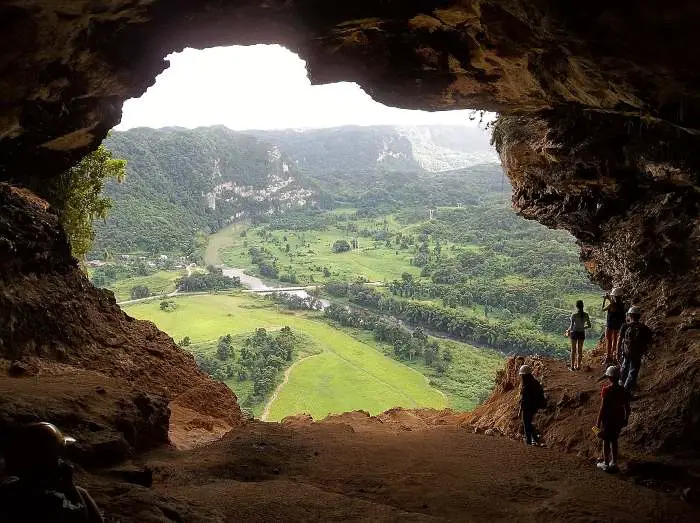
Safety in Puerto Rico
Is Puerto Rico a safe place to live?
Safety is a paramount concern for anyone considering a move to a new place. Puerto Rico, like any other location, has its own set of safety considerations.
While some areas may experience higher crime rates, it’s essential to note that the majority of Puerto Rico is safe and secure.
By adopting a cautious approach and staying informed about specific neighborhoods, anyone who moves to the island can enjoy a safe and fulfilling life on the island.
Puerto Rico has strong security measures in place to ensure the well-being of its residents.
Taking standard precautions such as being aware of one’s surroundings, securing personal belongings, and following local safety guidelines can contribute to a sense of security and peace of mind.
>> Related reading:
The safest countries in South America in 2024
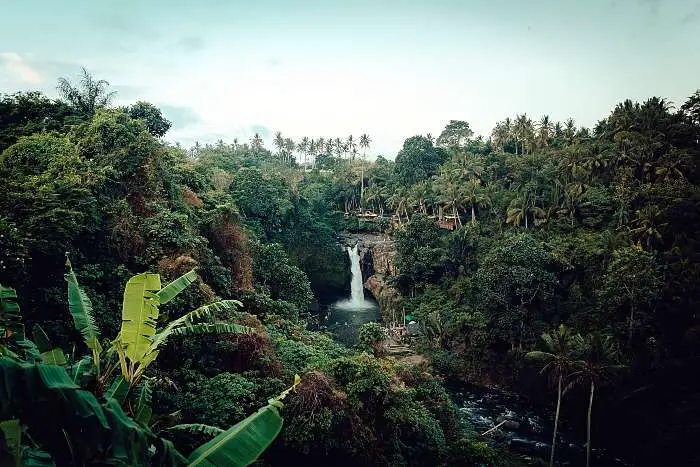
Cost of Living in Puerto Rico
One of the key attractions of living in Puerto Rico is its favorable cost of living compared to mainland United States cities.
While expenses vary depending on location and lifestyle choices, overall, the cost of housing, groceries, and things to do in Puerto Rico tends to be more affordable, even though it is increasing lately due to inflation.
Expats can enjoy a comfortable life without compromising on quality, making Puerto Rico an enticing option for those seeking financial stability and an improved standard of living.
Housing costs in Puerto Rico are generally lower than in many major U.S. cities, although it’s not necessarily affordable for the locals.
There are various options available, ranging from apartments to single-family homes. Rental prices can vary depending on the location, size, and amenities of the property.
It’s advisable to research the local housing market, consider personal preferences, and work with reputable real estate agents to find a suitable and affordable place to live.
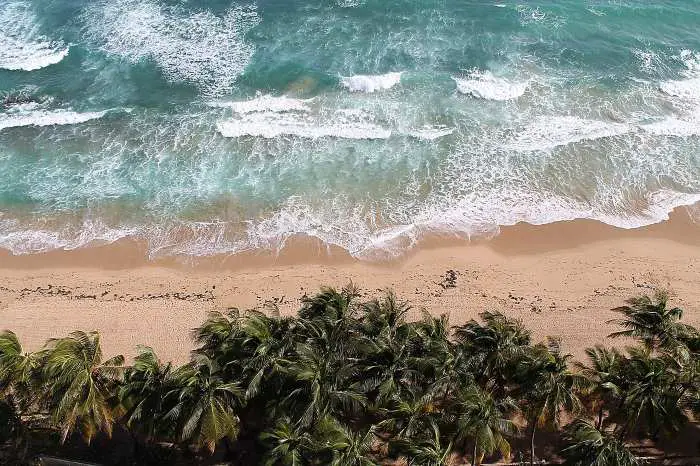
Pros of Life in Puerto Rico
Here the main pros of living in Puerto Rico 2024:
Pro #1: Affordability
As mentioned, one of the main pros of living in Puerto Rico is its favorable cost of living, especially when compared to the mainland US.
While expenses vary, depending on various lifestyle choices, for the most part the cost of living tends to be affordable. You will find an abundance of cheap food, transportation, activities, and affordable hotels in Puerto Rico.
This means you can enjoy a comfortable life without compromising on quality, making this an enticing option for those seeking financial stability and an improved quality of everyday life while living in Puerto Rico.
Pro #2: Breathtaking Natural Beauty
This tropical paradise is known for its stunning landscapes, from pristine beaches to lush rainforests.
Living in Puerto Rico allows residents to immerse themselves in a remarkable natural environment that offers endless opportunities for outdoor activities and exploration.
Sun-kissed beaches such as Flamenco Beach in Culebra or Playa Sucia in Cabo Rojo offer idyllic spots for relaxation or water sports activities like snorkeling or surfing. El Yunque National Forest provides a mesmerizing escape into lush greenery with majestic waterfalls and hiking trails.
Whether it’s hiking through El Yunque, surfing in Rincón, or snorkeling in Vieques, the island’s natural beauty provides a backdrop for an active, healthy, and fulfilling lifestyle.
Pro #3: Vibrant Culture and Heritage
Puerto Rico has a rich and diverse cultural heritage influenced by Spanish, African, and Taíno traditions.
The island’s tropical music, dance, art, and culinary scene provide residents with a vibrant and engaging cultural experience. Festivals such as Carnaval de Ponce and Fiestas San Sebastián showcase the vibrant culture and gastronomy that define Puerto Rican culture.
From the lively rhythms of salsa and reggaeton to the colorful festivals and art galleries, Puerto Rico offers a tapestry of cultural expressions that celebrate its unique identity.
Pro #4: Residency
As a U.S. territory, Puerto Rico offers a unique advantage to U.S. citizens by granting them automatic residency.
However, it’s important to understand the specific requirements and paperwork involved to ensure a hassle-free transition. It’s advisable to consult with immigration professionals or government agencies to navigate the residency process effectively.
Pro #5: Healthcare
Puerto Rico has a decent healthcare system, with modern facilities and highly trained medical professionals.
Expats should explore private health insurance options to complement the public healthcare system and ensure comprehensive coverage.
It’s recommended to research and select a suitable healthcare plan that meets personal needs and provides access to quality healthcare services.
Pro #6: Education
Puerto Rico offers a diverse range of educational opportunities, including public and private schools, as well as reputable universities.
Researching the education system and exploring suitable options for children is vital for ex-pat families. Many schools in Puerto Rico follow the American curriculum, which can be beneficial for those seeking familiarity and continuity in their children’s education.
Additionally, the island’s universities offer various academic programs for higher education seekers.
Pro #7: Tax Advantages
Puerto Rico offers unique tax incentives to attract businesses and individuals.
Through Acts 20 and 22, individuals can benefit from tax exemptions on certain types of income, making it an appealing destination for entrepreneurs and investors.
These tax incentives have attracted a growing community of professionals and businesses to the island, contributing to its economic development and creating new opportunities for residents.
Pro #8: Delicious local Cuisine
Puerto Rican cuisine is renowned for its flavorful blend of influences from various cultures.
Traditional and staple dishes such as mofongo (fried plantains), arroz con gandules (rice with pigeon peas), lechón asado (roast pork), fresh seafood, and other exotic foods tantalize taste buds across the island.
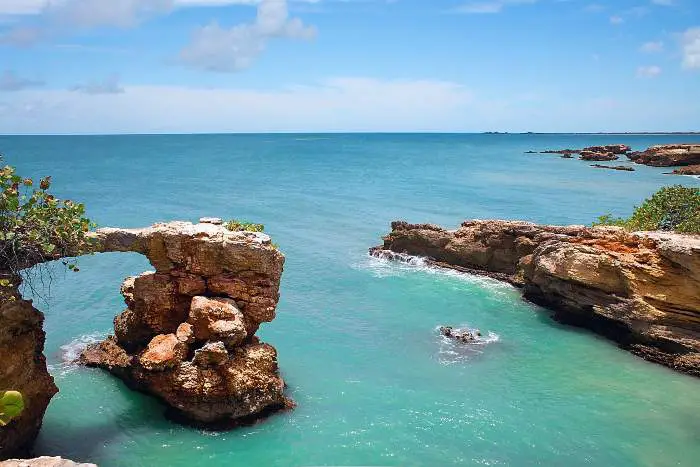
Cons of Life in Puerto Rico
You may be wondering, what are the drawbacks to living in Puerto Rico 2024?
While Puerto Rico boasts beautiful beaches, a vibrant culture, and a tropical climate, it is important to acknowledge that residing on this cheap Caribbean island also comes with its fair share of challenges, difficulties, and disadvantages.
Here the main cons of living in Puerto Rico:
Con #1: Limited Job Opportunities
The island has struggled with economic challenges for a long time. This has naturally led to limited job opportunities for both locals and new residents alike. The unemployment rate has been consistently higher than that of most U.S. states, making finding stable employment a difficult task for those seeking financial stability.
While Puerto Rico does offer a range of employment opportunities, it’s important to note that the job market can be competitive, particularly for high-skilled positions.
Expats may need to explore job prospects in advance or consider remote work options.
Networking, building professional connections, and leveraging specialized skills can increase the chances of finding suitable employment opportunities.
Con #2: Infrastructure Challenges
Some parts of Puerto Rico may experience occasional infrastructure challenges, such as power outages or limited access to certain services.
However, efforts are continually made to improve and overcome these issues.
It’s important to have backup plans in place and be prepared for occasional inconveniences that may arise due to infrastructure challenges.
Con #3: Language Barrier
Although English is widely spoken, there may be instances where a language barrier exists, especially in more remote areas where English proficiency can vary significantly depending on education and exposure levels.
Non-Spanish speakers may face communication barriers in certain areas or when dealing with government agencies or local businesses outside major tourist destinations like San Juan.
Learning Spanish phrases can help ex-pats navigate daily interactions and foster stronger connections within the local community.
Language classes or online resources can assist in acquiring language skills and enhancing the overall experience of living in Puerto Rico.
Con #4: Vulnerability to Natural Disasters
Living in Puerto Rico means being exposed to natural disasters. These include hurricanes and earthquakes that have a greater probability of occuring more frequently than in many other locations around the world.
In recent years, devastating hurricanes have caused significant damage across the island’s infrastructure and disrupted essential services like electricity and clean water supply for extended periods of time.
Con #5: Healthcare System Challenges
The healthcare system in Puerto Rico faces various challenges and challenges due to limited resources. This is compounded by funding issues due to its territorial status within the United States’ healthcare framework.
Accessing quality healthcare services can sometimes be a struggle due to overcrowded hospitals or limited availability of specialized care in certain regions.
Con #6: Political Uncertainty
The political status of this island territory has been a topic of debate for decades.
If you have been following the news, you are well aware of the ongoing discussions about whether it should become a U.S. state, an independent nation, or maintain its current territorial status.
This uncertainty can lead to instability and potential changes in economic policies, taxation systems, and government services that may impact the lives and long-term plans of locals as well as foreign residents.
Con #7: Relatively high cost of essentials
Yes, Puerto Rico is affordable, but it is important to keep in mind that residents often face inflated prices due to import taxes and shipping costs.
Additionally, electricity bills are known to be considerably higher compared to many mainland U.S. states.
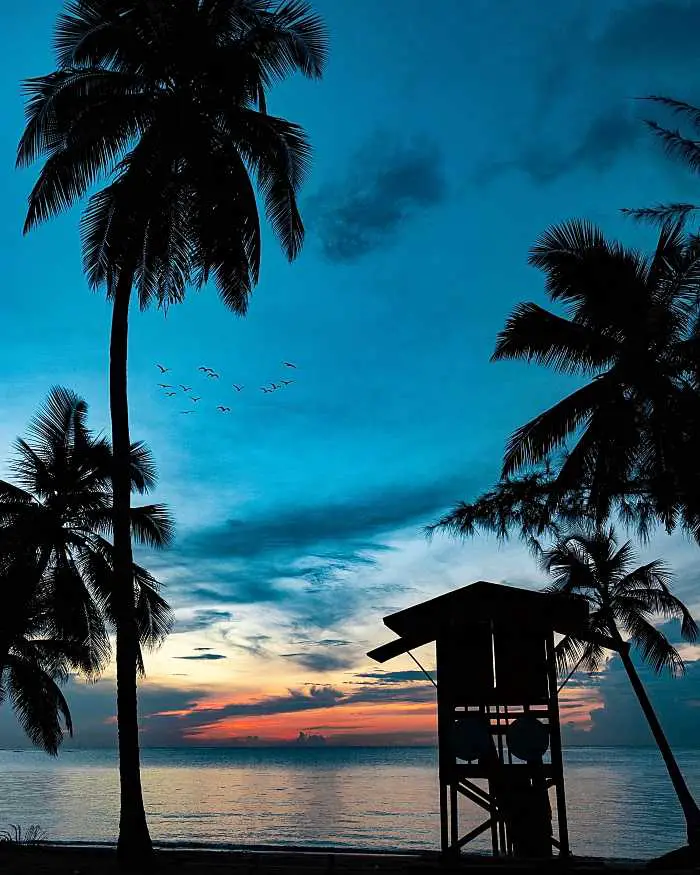
In conclusion…
Is it worth living in Puerto Rico?
The region offers a wealth of advantages as a good place to live in Puerto Rico for expats.
From its favorable cost of living and diverse linguistic landscape to its natural beauty and rich cultural heritage, this Caribbean gem has much to offer.
While it’s important to consider potential challenges such as limited job opportunities and occasional infrastructure issues, the overall experience of living in Puerto Rico is undeniably rewarding.
So, whether you are seeking a tropical paradise or a fresh start in a culturally vibrant environment, Puerto Rico is a destination worth exploring for your next chapter in life.
>> Must read:
Is San Juan and Puerto Rico a good place to live? What do you think?
I hope this has answered many of your questions and concerns about what life in Puerto Rico is like. Is there anything else you’d like to know about living in Puerto Rico in 2024? Let me know 🙂
Dale duro!
Rai

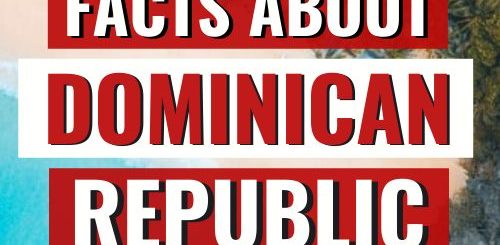

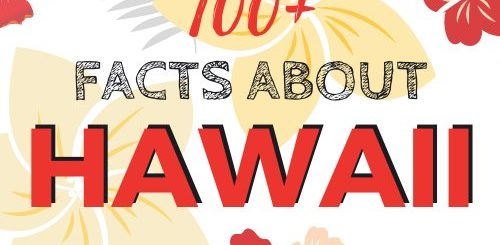
 New Here?
New Here? 









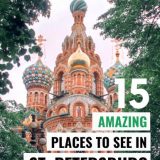



My wife’s family is from Puerto Rico and her father lives with us in Delaware because there are few health care services for the elderly there. Last year I was having breakfast at IHOP and struck up a conversation with a 74 year old working dentist with his autist grandson. He told me he chooses to work to serve the low income masses in Puerto Rico because many of the educated doctors, nurses and specialty doctors have gone to Florida where they can make a living wage. His son moved to California with his autistic son where they can get services for his autistic son. Quite bluntly he felt the health care system in Puerto Rico was on the verge of collapse. Saying that healthcare is a challenege there is being kind.
Additionally, the local government chooses to spend the profits from the electrical grid and not improve it. Brown outs & black outs are a way of life in Puerto Rico. After Hurrican Maria hit Puerto Rico, the real number of people that died was about 6500 of that 1/2 died because of ongoing medical conditions like dialysis that required hospitals having electric. People that required refrigerated diabetes’s medication died or were put at huge risks; along with the elderly because there was no electric or water.
Thanks for providing your perspective on this. This is appreciated since you have close ties to Puerto Rico. I will take these comments into consideration and update the post accordingly.